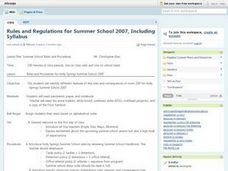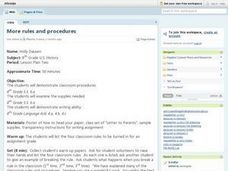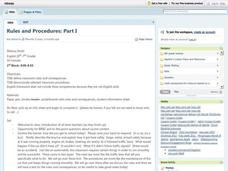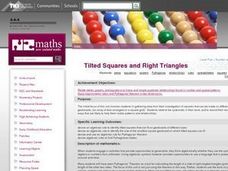Curated OER
Rules and Consequences in the Classroom
Students study rules and consequences as well as learn positive, healthy behaviors in and out of the classroom. In this behavior lesson, students discuss behaviors that got them into trouble at home. Students name trouble behaviors at...
Curated OER
Acting it Out
Students explore responsible behavior. In this character education instructional activity, students work in groups to act out scenarios using or disregarding responsible behavior. Students discuss personal feelings and consequences of...
Curated OER
Bullying-Role Play
Students investigate the effects of bullying. In this character education lesson, students role play various situations and discuss how to resolve them properly.
Curated OER
Listening Well
Students demonstrate good listening skills. In this listening skills lesson, students identify the signs people give when they are actively listening, such as eye contact. Students practice good listening skills in a an interview activity.
Curated OER
Posting Our Rules
Students illustrate classroom rules. In this common good lesson, students survey a variety of posters and discuss the messages they send. Students create their own poster illustrating classroom rules to be followed and hold a...
Curated OER
Class Rules (Responsible Personal Conduct)
Students consider the necessity of rules. In this citizenship lesson, students consider the reasons for rules as they are introduced to their classroom rules and procedures.
Curated OER
Relationships, Rules, and Responsibilities
First graders identify jobs in the environment. In this social justice instructional activity, 1st graders describe rules to protect the environment and the roles specific jobs play. Students construct environmental rules for an...
Curated OER
Reviewing the Rules
Young scholars participate in a group discussion to evaluate rules that the class created together. In this early childhood social studies lesson plan, students condense rules into categories and reword rules to be stated in the positive.
Curated OER
Adding and Subtracting Integers
In this adding and subtracting integers worksheet, students find the sum or difference of 9 problems. Students then evaluate 4 expressions given certain values.
Curated OER
Reasoning with Rules
In this reasoning with rules worksheet, students solve and complete 12 different problems that include applying various rules to solve the equations given. First, they assume all segments are straight and state the rule used to solve...
Curated OER
Bean Teasers
In this worksheet, students will examine the number of beans, to numerically calculate and the number of beans and place the beans in its proper place in each space. This worksheet would best be used with second and third graders. Who...
Curated OER
Volume
In this volume learning exercise, 8th graders solve and complete 6 different short answer questions and problems that relate to volume. First, they determine the number of cubes found altogether that has a given length, width and height....
Curated OER
Using Proof in Algebra
In this using proofs in algebra worksheet, 10th graders solve 2 proofs by applying the many rules from algebra for the Properties of Equality for real numbers. They name the property that justifies each statement as seen in the...
Curated OER
Being Fair At School - Secondary
In this fairness poster worksheet, secondary students read about the meaning and responsibility of being fair to others. They write examples of when they were fair to others, and how they value unique and individual qualities in others.
Curated OER
Look at the Past
In this social studies instructional activity looking at the past, students identify, list, and explain the materials that were used to build schools in the past as compared to their school today. Then they look at a photo of boys...
Curated OER
Summer School Rules and Procedures
Students examine the rules and procedures involved for taking summer school. They determine the consequences and rewards surrounding the compliance or non compliance with school expectations. The features of rules and expectations are...
Curated OER
More Rules and Procedures
Young scholars investigate classroom rules, procedures and expectations given by the teacher. They discuss the analogy of needing ingredients and supplies to bake a pie and needing ingredients and supplies to do their school work. ...
Curated OER
Classroom Rules and Procedures
Eighth graders participate in a brief introduction to the classroom rules and procedures. They role play the proper procedures for maintaining a productive classroom atmosphere. Rules and parent letters are distributed and discussed.
Curated OER
Classroom Rules and Procedures
Pupils participate in a brief introduction to the classroom rules and procedures. They role play the proper procedures for maintaining a productive classroom atmosphere. Rules and parent letters are distributed and discussed
Curated OER
Rules and Procedures: Part II
Students discuss personal responsibility. Students listen to the teacher as classroom rules, responsibilities and consequences are explained in detail. A volunteer is chosen to demonstrate what a tardy student is. Students fill out an...
Curated OER
Function Machines
Sixth graders complete a function table and determine a rule for the use of one. They graph different functons from the tables. The analogy of a machine is used as an example for teaching students about functions.
Curated OER
Rules of Divisibillity
Sixth graders participate in a instructional activity that covers the Rules of Divisibility. They play a game for a warm-up before the direct instruction. Following the rules being covered they finish the instructional activity using an...
Curated OER
Tilted Squares and Right Triangles
Pupils investigate squares. They generate patterns from structured situations and find a rule for the general term and express it using words and symbols. Students generate patterns from a rule and substitute values and formulas.
Curated OER
Classroom Rules
Learners participate in selection of language needed to form rules for the classroom. They explore the categories of: things you have to do, things you can't do and things you can do if you like. Then they break into groups and create...

























